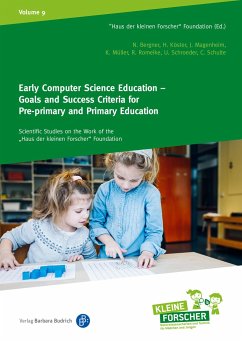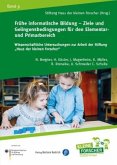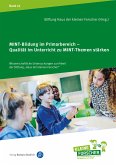Nadine Bergner, Hilde Köster, Johannes Magenheim
Early Computer Science Education - Goals and Success Criteria for Pre-Primary and Primary Education
Herausgegeben:Stiftung Haus der kleinen Forscher;Mitarbeit:Chabay, Ilan
Nadine Bergner, Hilde Köster, Johannes Magenheim
Early Computer Science Education - Goals and Success Criteria for Pre-Primary and Primary Education
Herausgegeben:Stiftung Haus der kleinen Forscher;Mitarbeit:Chabay, Ilan
- Broschiertes Buch
- Merkliste
- Auf die Merkliste
- Bewerten Bewerten
- Teilen
- Produkt teilen
- Produkterinnerung
- Produkterinnerung
Das Buch beschreibt Ziele und Erfolgskriterien der frühen informatischen Bildung im Vorschul- und Grundschulalter. Zwei Expertisen benennen pädagogische Inhaltsdimensionen der informatischen Bildung und geben Empfehlungen für die Weiterentwicklung der Angebote der Stiftung "Haus der kleinen Forscher". Beschrieben wird auch die Umsetzung dieser fachlichen Empfehlungen in den Programmen der Stiftung "Haus der kleinen Forscher".
Andere Kunden interessierten sich auch für
![Frühe informatische Bildung - Ziele und Gelingensbedingungen für den Elementar- und Primarbereich Frühe informatische Bildung - Ziele und Gelingensbedingungen für den Elementar- und Primarbereich]() Nadine BergnerFrühe informatische Bildung - Ziele und Gelingensbedingungen für den Elementar- und Primarbereich24,90 €
Nadine BergnerFrühe informatische Bildung - Ziele und Gelingensbedingungen für den Elementar- und Primarbereich24,90 €![Kita-Entwicklung - Ansätze und Konzepte für Organisationsentwicklung in der frühen Bildung Kita-Entwicklung - Ansätze und Konzepte für Organisationsentwicklung in der frühen Bildung]() Itala BallaschkKita-Entwicklung - Ansätze und Konzepte für Organisationsentwicklung in der frühen Bildung24,90 €
Itala BallaschkKita-Entwicklung - Ansätze und Konzepte für Organisationsentwicklung in der frühen Bildung24,90 €![Kita-Entwicklung - Organisationsentwicklung als Chance für die frühe Bildung Kita-Entwicklung - Organisationsentwicklung als Chance für die frühe Bildung]() Dagmar Bergs-WinkelsKita-Entwicklung - Organisationsentwicklung als Chance für die frühe Bildung24,90 €
Dagmar Bergs-WinkelsKita-Entwicklung - Organisationsentwicklung als Chance für die frühe Bildung24,90 €![Early Childhood Education Leadership in Times of Crisis Early Childhood Education Leadership in Times of Crisis]() Early Childhood Education Leadership in Times of Crisis28,99 €
Early Childhood Education Leadership in Times of Crisis28,99 €![MINT-Bildung im Primarbereich - Qualität im Unterricht zu MINT-Themen stärken MINT-Bildung im Primarbereich - Qualität im Unterricht zu MINT-Themen stärken]() MINT-Bildung im Primarbereich - Qualität im Unterricht zu MINT-Themen stärken24,90 €
MINT-Bildung im Primarbereich - Qualität im Unterricht zu MINT-Themen stärken24,90 €![Handbuch Frühe Kindheit Handbuch Frühe Kindheit]() Handbuch Frühe Kindheit78,00 €
Handbuch Frühe Kindheit78,00 €![Erlebnispädagogik und Gender Erlebnispädagogik und Gender]() Ramona SchneiderErlebnispädagogik und Gender49,90 €
Ramona SchneiderErlebnispädagogik und Gender49,90 €-
-
-
Das Buch beschreibt Ziele und Erfolgskriterien der frühen informatischen Bildung im Vorschul- und Grundschulalter. Zwei Expertisen benennen pädagogische Inhaltsdimensionen der informatischen Bildung und geben Empfehlungen für die Weiterentwicklung der Angebote der Stiftung "Haus der kleinen Forscher". Beschrieben wird auch die Umsetzung dieser fachlichen Empfehlungen in den Programmen der Stiftung "Haus der kleinen Forscher".
Produktdetails
- Produktdetails
- Wissenschaftliche Untersuchungen zur Arbeit der Stiftung "Haus der kleinen Forscher" 9
- Verlag: Verlag Barbara Budrich
- Artikelnr. des Verlages: 12074
- Seitenzahl: 338
- Erscheinungstermin: 3. April 2023
- Englisch
- Abmessung: 238mm x 167mm x 24mm
- Gewicht: 835g
- ISBN-13: 9783847426462
- ISBN-10: 384742646X
- Artikelnr.: 63752196
- Herstellerkennzeichnung
- Verlag Barbara Budrich GmbH
- Stauffenbergstr. 7
- 51379 Leverkusen
- buch@budrich-unipress.de
- www.budrich-verlag.de
- +49 (02171) 7949150
- Wissenschaftliche Untersuchungen zur Arbeit der Stiftung "Haus der kleinen Forscher" 9
- Verlag: Verlag Barbara Budrich
- Artikelnr. des Verlages: 12074
- Seitenzahl: 338
- Erscheinungstermin: 3. April 2023
- Englisch
- Abmessung: 238mm x 167mm x 24mm
- Gewicht: 835g
- ISBN-13: 9783847426462
- ISBN-10: 384742646X
- Artikelnr.: 63752196
- Herstellerkennzeichnung
- Verlag Barbara Budrich GmbH
- Stauffenbergstr. 7
- 51379 Leverkusen
- buch@budrich-unipress.de
- www.budrich-verlag.de
- +49 (02171) 7949150
The ¿Haus der kleinen Forscher¿ Foundation has been committed to improving the education for children between the ages of three and ten in the domains of science, technology, computer science, and mathematics. Partners are Siemens Stiftung, Dietmar Hopp Stiftung, the Dieter Schwarz Foundation, and Friede Springer Stiftung. The German Federal Ministry of Education and Research supports the programme. The foundation is based in Berlin, Germany.
About the AuthorsPrefaceForeword (Ilan Chabay)Introduction ("Haus der kleinen Forscher" Foundation)1 Overview of the "Haus der kleinen Forscher" Foundation2 Relevance of Early Computer Science Education3 Professional Basis for the Subject Area of "Computer Science"Summary of Key Findings ("Haus der kleinen Forscher" Foundation)A Goal Dimensions of Computer Science Education at the Elementary and Primary Level (Nadine Bergner, Hilde Köster, Johannes Magenheim, Kathrin Müller, Ralf Romeike, Ulrik Schroeder, Carsten Schulte)1 Potential of Computer Science Education1.1 What is Computer Science?1.2 Computer Science as a Science1.3 Construction in Computer Science1.4 Similarities and Differences in Computer Science in Comparison1.5 Computer Science and Computer Science Education1.6 The Relationship of Computer Science Education, Media Education & Digital Education1.7 Conclusion: Computer Science Education for all2 Foundation of Goals on the Children's Level2.1 Children in Digital Worlds2.2 Foundations of Learning Psychology2.3 Access to Computer Science for Children2.4 International Comparison: Curricula and their Classification in the Competence Model2.5 Placing the International Standards Within the Framework of a Competence Model for Computer Science Education at the Primary Level2.6 Results/Conclusion3 Goals at the Level of the Children3.1 Overarching Basic Competencies3.2 Motivation, Interest and Self-Efficacy of Computer Science3.3 Computer Science Competencies of Children3.4 Prioritisation of Specific Competence Expectations at the Level of the Children4 Goals for Early Childhood Educators and Primary School Teachers4.1 Motivation, Interest and Self-Efficacy4.2 Attitudes, Approaches and Understanding of Roles4.3 Computer Science Competencies4.4 Computer Science Didactic Competencies4.5 Key Competencies for Dealing With Digital Media4.6 Conclusion/Recommendations5 Examples of Prioritised Competence Domains for Computer Science Education5.1 Examples of Early Computer Science Education5.2 Summary Heat Map of Priority Setting in the Examples6 Prerequisites for Successful Early Computer Science Education6.1 General Conditions for Successful Implementation6.2 Measuring Instruments to Determine the Prerequisites for Success7 ConclusionB Professional Recommendations for Informatics Systems (Nadine Bergner, Kathrin Müller)1 Introduction2 Overview of Possible Informatics Systems3 Description and Technical Assessment of Individual Informatics Systems3.1 Cubetto Robot from Primo Toys3.2 Beebot from Terrapin3.3 KIBO from KinderLab Robotics3.4 Ozobot/Ozobit from Evollve Inc.3.5 LEGO WeDo 2.03.6 Dash & Dot from Wonder Workshop3.7 Scratch and ScratchJR3.8 Makey Makey from JoyLabzLLC3.9 LEGO Mindstorms (NXT & EV3)3.10 Arduino Microcontroller with ArduBlock4 Recommendations5 ConclusionConclusion and Outlook - How the "Haus der kleinen Forscher" Foundation uses the findings ("Haus der kleinen Forscher" Foundation)1 Recommendations from the Expert Reports as a Basis for the (further) Development of the Foundation's Substantive Offerings1.1 Motivation, Interest and Self-Efficacy when Dealing with Computer Science1.2 Computer Science Process Domains1.3 Computer Science Content Domains1.4 Computer Science Didactic Competencies1.5 Attitudes, Mindsets and Understanding of Roles with Regard to the Design of Computer Science Education2 Digital Education - A Chance for Good Early STEM Education for Sustainable Development3 Scientific Monitoring and Evaluation of the Professional Development Workshops4 Outlook - Organisational Development in Educational InstitutionsReferencesAppendixIllustration Credits"Haus der kleinen Forscher" FoundationEnglish Publications issued by the "Haus der kleinen Forscher" Foundation to date
About the AuthorsPrefaceForeword (Ilan Chabay)Introduction ("Haus der kleinen Forscher" Foundation)1 Overview of the "Haus der kleinen Forscher" Foundation2 Relevance of Early Computer Science Education3 Professional Basis for the Subject Area of "Computer Science"Summary of Key Findings ("Haus der kleinen Forscher" Foundation)A Goal Dimensions of Computer Science Education at the Elementary and Primary Level (Nadine Bergner, Hilde Köster, Johannes Magenheim, Kathrin Müller, Ralf Romeike, Ulrik Schroeder, Carsten Schulte)1 Potential of Computer Science Education1.1 What is Computer Science?1.2 Computer Science as a Science1.3 Construction in Computer Science1.4 Similarities and Differences in Computer Science in Comparison1.5 Computer Science and Computer Science Education1.6 The Relationship of Computer Science Education, Media Education & Digital Education1.7 Conclusion: Computer Science Education for all2 Foundation of Goals on the Children's Level2.1 Children in Digital Worlds2.2 Foundations of Learning Psychology2.3 Access to Computer Science for Children2.4 International Comparison: Curricula and their Classification in the Competence Model2.5 Placing the International Standards Within the Framework of a Competence Model for Computer Science Education at the Primary Level2.6 Results/Conclusion3 Goals at the Level of the Children3.1 Overarching Basic Competencies3.2 Motivation, Interest and Self-Efficacy of Computer Science3.3 Computer Science Competencies of Children3.4 Prioritisation of Specific Competence Expectations at the Level of the Children4 Goals for Early Childhood Educators and Primary School Teachers4.1 Motivation, Interest and Self-Efficacy4.2 Attitudes, Approaches and Understanding of Roles4.3 Computer Science Competencies4.4 Computer Science Didactic Competencies4.5 Key Competencies for Dealing With Digital Media4.6 Conclusion/Recommendations5 Examples of Prioritised Competence Domains for Computer Science Education5.1 Examples of Early Computer Science Education5.2 Summary Heat Map of Priority Setting in the Examples6 Prerequisites for Successful Early Computer Science Education6.1 General Conditions for Successful Implementation6.2 Measuring Instruments to Determine the Prerequisites for Success7 ConclusionB Professional Recommendations for Informatics Systems (Nadine Bergner, Kathrin Müller)1 Introduction2 Overview of Possible Informatics Systems3 Description and Technical Assessment of Individual Informatics Systems3.1 Cubetto Robot from Primo Toys3.2 Beebot from Terrapin3.3 KIBO from KinderLab Robotics3.4 Ozobot/Ozobit from Evollve Inc.3.5 LEGO WeDo 2.03.6 Dash & Dot from Wonder Workshop3.7 Scratch and ScratchJR3.8 Makey Makey from JoyLabzLLC3.9 LEGO Mindstorms (NXT & EV3)3.10 Arduino Microcontroller with ArduBlock4 Recommendations5 ConclusionConclusion and Outlook - How the "Haus der kleinen Forscher" Foundation uses the findings ("Haus der kleinen Forscher" Foundation)1 Recommendations from the Expert Reports as a Basis for the (further) Development of the Foundation's Substantive Offerings1.1 Motivation, Interest and Self-Efficacy when Dealing with Computer Science1.2 Computer Science Process Domains1.3 Computer Science Content Domains1.4 Computer Science Didactic Competencies1.5 Attitudes, Mindsets and Understanding of Roles with Regard to the Design of Computer Science Education2 Digital Education - A Chance for Good Early STEM Education for Sustainable Development3 Scientific Monitoring and Evaluation of the Professional Development Workshops4 Outlook - Organisational Development in Educational InstitutionsReferencesAppendixIllustration Credits"Haus der kleinen Forscher" FoundationEnglish Publications issued by the "Haus der kleinen Forscher" Foundation to date








